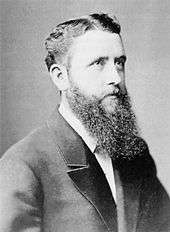Otto Schoetensack
Otto Schoetensack (German: [ˈʃoːtənzak]; July 12, 1850 in Stendal – December 23, 1912 in Ospedaletti) was a German industrialist and later professor of anthropology, having retired from the chemical firm which he had founded. During a 1908 archeological dig, he oversaw the worker Daniel Hartmann who found the lower jaw of a hominid, the oldest human fossil then known, which Schoetensack later described formally as Homo heidelbergensis.

Otto Schoetensack (1882)
Publications
Schoetensack's grave in Heidelberg
- "Der Unterkiefer des Homo heidelbergensis aus den Sanden von Mauer bei Heidelberg" (The lower jaw of the Homo heidelbergensis out of the sands of Mauer near Heidelberg). 1908. Leipzig: Wilhelm Engelmann.
gollark: > “I’ll tag along; I need to get back with my party. We got some work to do in the next 3 months to make sure we’re all ready for the Treasure Hunt and won’t embarrass Haven,” Niel answered.This should say "Neil", not "Niel".
gollark: I think it's right if slightly odd.
gollark: Hmm. According to arbitrary dictionary websites, it only means that. Oh well.
gollark: I know that that *also* means the first showing of a thing.
gollark: Wow, it already stopped sounding like a real word, the power of semantic saturation is truly immense.
External links
- Biography (in German).
- Works by Otto Schoetensack at Project Gutenberg
- Works by or about Otto Schoetensack at Internet Archive
This article is issued from Wikipedia. The text is licensed under Creative Commons - Attribution - Sharealike. Additional terms may apply for the media files.